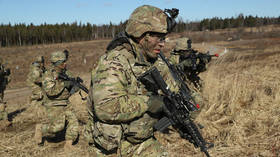A US-led military alliance is closing in on Russia – what you need to know

The US is continuing a strategy of containing Russia militarily by forming deepening military alliances on the country’s border. This strategy is non-derogable, even if it means forming relationships with nationalists.
Just this month, Estonia signed a defense co-operation agreement with the United States, the third and final Baltic state to do so. The news of this strengthening military alliance has come at about the same time as the entering into force of another defense cooperation agreement, this time signed with the United Arab Emirates (UAE).
The US-Estonia agreement was signed at the Pentagon and reportedly covers defense cooperation for the two nations through to the year 2024, though it provides little detail on what will take place over the next five years, let alone a dollar figure as to the amount the US taxpayer will contribute. However, what we do know according to a US Defense Department release is that the areas of cooperation will likely include “capability development and defense-related aid, training exercise, cyber defense, the Estonian Defense League, training areas and host nation support.”
It also seems likely that Estonia will be looking to host more military exercises on its soil, including cyber-based exercises. As it transpires, Estonia is one of the most advanced countries in the world when it comes to the use of cyber technology, famous for the implementation of its so-called e-government (even Skype was created by Estonians, and much of Skype’s technical work still runs from the Baltic state). According to Stratfor, the world’s “leading geopolitical intelligence platform,” Estonia has become a leader in issues of cybersecurity. The nation is currently home to the NATO Cooperative Cyber Defense Control Center of Excellence.
Also on rt.com ‘Approaching competitive’ US 2nd Fleet seeks to confront Russia in ArcticThe latest development once again flies directly in the face of the already debunked theory that the Trump administration was not only appointed by the Russian government, but continues to receive its orders from Russian President Vladimir Putin. In reality, the new defense cooperation agreement is part and parcel of a US-Baltic Strategic Dialogue which began in November last year.
On a side but also intriguingly relevant note, the US has also launched a multimillion-dollar strategy to get allies Albania, Bosnia, Croatia, Greece, North Macedonia and Slovakia off Russian military equipment. The plan is being implemented so rapidly that State Department officials are expecting to expand the program within the next few weeks. Such a strategy is set to make an already lucrative US-owned defense industry even more lucrative, but for some reason you will never see Rachel Maddow on MSNBC complaining that Donald Trump is in the pockets of the military industrial complex, despite the overwhelming evidence that Trump has prioritized the sale of US weapons systems overseas.
Estonia’s commitment to NATO
Estonia is already a member of NATO (and the EU), having joined the North Atlantic military organization in 2004. It famously is one of the handful of members to meet its NATO commitments of spending over two percent of its gross domestic product (GDP) on defense, and is also in the process of modernizing and strengthening its military.
Estonia’s current ambassador to the US, Jonatan Vseviov, once told Defense News that NATO was the “cornerstone of our security.” Vseviov is of the opinion that NATO does a lot of good work on defense “and deterrence” – which can be a direct reference to one country and one country only.
Just recently, a major news agency from the Baltic region said that a Russian military aircraft had made a brief, minute-long incursion into Estonian airspace. Don’t get me wrong, the timing of this recently signed agreement is probably just a coincidence, but I think the geopolitical issues at stake speak for themselves.
As part of the “deterrence,” Vseviov also explained that discussions had been underway between Estonia, Latvia and Denmark to set up a Multinational Division North to complement what Poland has already established.
NATO, for its part, has done nothing but praise Estonia for its contribution to the military alliance.
Also on rt.com A world aching for peace & stability can no longer afford NATOAn ‘entangling’ nationalist alliance
The United States is currently legally obligated to “defend” approximately over a quarter of the world’s population. While diehard American patriots may become aroused at the idea of an ever-expanding US empire, one should know that this idea is directly at odds with the ideals of the founding fathers who supposedly fathered your “great” nation. As Thomas Jefferson said in his pledge, “Peace commerce, and honest friendship with all nations. Entangling alliances with none.” Those who want to make America “great again” could perhaps heed some of the advice of those very people they claim to be inspired by.
Take, for example, the topic at hand: a newfound defense agreement with Estonia. Estonia has emerged as one of the strongest faces of the right-wing populist movement sweeping across the European continent . Its nationalist EKRE won 19 out of 101 seats in parliament and was invited to form a coalition government with Estonian Prime Minister Juri Ratas.
READ MORE: Anti-establishment parties scored big in EU elections since bloc became ‘problem & not solution’
The ludicrous part is that, while Estonia has jumped on the anti-immigration sentiment sweeping through much of Europe, available statistics don’t support the idea that Estonia has an immigration issue of any sort. According to Stratfor, Estonia is facing a declining population mainly because emigration rates are high and birthrates are lacking. Politico also notes that Estonia, with a population of only 1.3 million, has only taken in 206 refugees since 2015, with 80 of those same refugees having already left the country.
How the Estonian nationalists have been able to sell what can only be described as the complete myth of an influx of refugees and migrants into their country is beyond me, but whatever they have been selling has been working to stir up a Trump-esque platform inside the country. Using slogans like it wants to protect an “indigenous Estonian” population under “threat” while it rallies against the EU, immigrants, same-sex relationships and feminism, the EKRE has gone from strength to strength.
A significant part of Estonia is made up of ethnic-speaking Russians, making this all problematic for both the US and the nationalists. If the US wants to isolate Estonia from Russia, it still has to contend with this significant minority. As Washington should have learnt in Ukraine, this is not a minor issue to contend with. As for the right-wing party, they will have to somehow come to grips with an already diverse local population which is likely to not see eye-to-eye with its nationalist vision.
Still, just like in Ukraine, the US has found a convenient and useful friendship with nationalist elements – as long as it means that Washington can push back further and contain Russia. Because at the end of the day, whether they are known neo-Nazis or known radical Islamists, as long as they are anti-Russian, they are a friend of the US (the worst-known interpretation of the phrase: the enemy of my enemy is my friend).
Think your friends would be interested? Share this story!
The statements, views and opinions expressed in this column are solely those of the author and do not necessarily represent those of RT.















